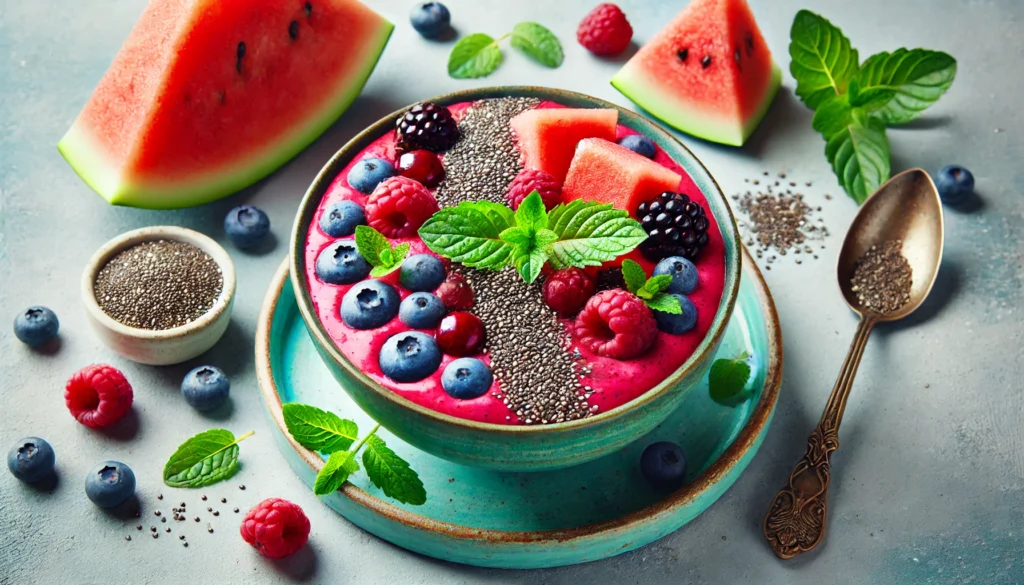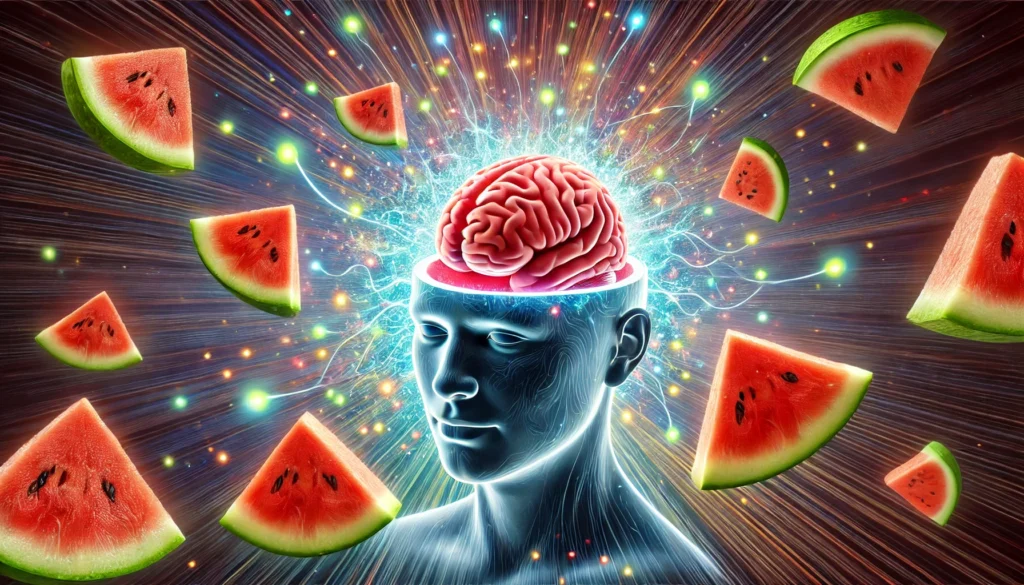In recent years, watermelon has transcended its status as a mere summertime refreshment and has emerged as a potent player in the realm of health and wellness. The question, “is watermelon good for your brain?” has sparked curiosity among health enthusiasts and researchers alike. This succulent fruit, often synonymous with picnics and barbecues, holds more potential than meets the eye. In this exploration, we will delve into the watermelon health benefits, specifically focusing on its impact on brain health, while unraveling the scientific intricacies and practical implications.
You may also like: Memory-Boosting Foods You Should Try Today
The Nutritional Powerhouse: Watermelon
To fully appreciate what watermelon does to your brain, it is essential to understand its nutritional composition. This vibrant fruit is composed of approximately 92% water, which makes it an excellent hydrating agent. However, its benefits extend beyond mere hydration. Watermelon is rich in vitamins A and C and is a source of important antioxidants like lycopene and beta-carotene. These nutrients play a crucial role in maintaining overall health, but their specific impact on brain function is particularly noteworthy.
A Closer Look at Vitamins A and C
Vitamins A and C are essential for a well-functioning brain. Vitamin A is involved in maintaining healthy vision and neurological function. It supports the synthesis of neurotransmitters, which are vital for communication between brain cells. Vitamin C, on the other hand, is crucial for the synthesis of dopamine, a neurotransmitter that plays a significant role in mood regulation and cognitive function. By incorporating watermelon into your diet, you not only support your brain health but also boost your immune system, thanks to these vitamins.
Beta-Carotene: A Visionary Nutrient
Beta-carotene, a precursor to vitamin A, is found in abundance in watermelon. This nutrient is known for its ability to support eye health, but its benefits extend to the brain as well. Beta-carotene has been associated with a reduced risk of cognitive decline, especially in older adults. It acts as an antioxidant, protecting brain cells from oxidative damage. Regular consumption of watermelon can ensure a steady supply of beta-carotene, helping to maintain cognitive sharpness and reduce the risk of age-related memory issues.
The Role of Hydration in Cognitive Performance
The brain’s reliance on hydration is often underestimated. Watermelon, with its high water content, serves as an excellent source of hydration, which is vital for maintaining cognitive performance. Dehydration can lead to a range of cognitive impairments, including difficulties with concentration, memory lapses, and mood swings. By keeping the brain well-hydrated through regular consumption of watermelon, individuals can support mental clarity and sustain cognitive efficiency throughout the day.
Watermelon’s Impact on Brain Health
The benefits of watermelon on brain health are both direct and indirect. Let’s explore these pathways.
Cognitive Enhancement Through Blood Flow
Watermelon contains citrulline, an amino acid that is converted into arginine in the body. Arginine is essential for the production of nitric oxide, a molecule that aids in dilating blood vessels and improving blood circulation. Enhanced blood flow ensures that the brain receives a sufficient supply of oxygen and nutrients, which is crucial for maintaining cognitive functions. This improved circulation can lead to better attention, quicker information processing, and enhanced problem-solving capabilities.
Mood Regulation and Stress Reduction
The impact of watermelon on mood regulation is closely tied to its influence on blood flow and nutrient delivery to the brain. When the brain is well-nourished, it can produce neurotransmitters more efficiently, supporting mood stability and reducing stress levels. Watermelon’s nutrients work synergistically to promote a sense of calm and well-being, making it a natural ally in managing stress and anxiety.
Learning, Memory, and Neuroplasticity
Some studies suggest that increased nitric oxide levels, facilitated by watermelon consumption, can enhance learning and memory capabilities. Nitric oxide supports neuroplasticity, the brain’s ability to reorganize itself by forming new neural connections. This adaptability is key to learning new skills and retaining information. By supporting neuroplasticity, watermelon can play a role in lifelong learning and cognitive resilience.
Neuroprotection and Anti-inflammatory Effects
Chronic inflammation is a contributing factor to many neurological disorders. Watermelon’s constituents, particularly lycopene and vitamin C, exhibit anti-inflammatory properties. These nutrients can help mitigate inflammation in the brain, offering a protective effect against conditions like depression and neurodegenerative diseases.

Combating Inflammation at the Cellular Level
Lycopene and vitamin C work at the cellular level to reduce inflammation, which is a root cause of many chronic health conditions. By lowering inflammation, these antioxidants protect brain cells from damage and degeneration. This protective effect is crucial in preventing neurodegenerative diseases such as Alzheimer’s and Parkinson’s, where inflammation plays a significant role.
Supporting Neurotransmitter Balance
The nutrients in watermelon not only reduce inflammation but also support neurotransmitter balance. A balanced neurotransmitter environment is essential for maintaining mood stability and cognitive function. Watermelon’s components help regulate the production and breakdown of neurotransmitters, ensuring that the brain operates smoothly and efficiently.
Mental Sharpness and Energy Boost
Watermelon’s natural sugars provide a quick energy boost, which can be beneficial for mental alertness. While these sugars are simple carbohydrates, the presence of fiber in watermelon ensures a slower release of sugar into the bloodstream, preventing the spikes and crashes associated with other sugary snacks. This steady energy supply can aid in maintaining mental sharpness throughout the day.
Sustained Energy for Cognitive Tasks
The combination of natural sugars and fiber in watermelon provides a sustained energy release, which is ideal for tackling cognitive tasks. This steady energy supply helps maintain focus and concentration, making watermelon a smart choice for those needing to stay mentally sharp throughout the day. Whether preparing for an exam or tackling a challenging project, watermelon can provide the energy needed to perform at one’s best.
Supporting Brain Health with Natural Sugars
Unlike processed sugars, the natural sugars in watermelon come with the added benefits of vitamins, minerals, and fiber. These nutrients work together to support brain health, offering a more balanced energy source. The presence of natural sugars in watermelon ensures that energy levels remain stable, contributing to better mood regulation and cognitive performance.
The Role of Watermelon in Preventing Cognitive Decline
Regular consumption of watermelon can play a role in preventing cognitive decline, thanks to its nutrient-rich profile. The antioxidants and anti-inflammatory properties of watermelon help protect brain cells from damage, reducing the risk of cognitive impairments. By incorporating watermelon into a balanced diet, individuals can support long-term brain health and reduce the likelihood of age-related cognitive decline.
Historical Context and Current Trends
Historically, watermelon has been consumed for its refreshing qualities and basic nutritional benefits. However, its recognition as a functional food with specific brain health advantages is a more recent development. This shift is reflected in current wellness trends, where watermelon is increasingly incorporated into brain-boosting diets, juices, and smoothies.
Watermelon in Traditional Practices
In many cultures, watermelon has been used in traditional medicine for its cooling and hydrating properties. Ancient civilizations recognized its ability to quench thirst and provide essential nutrients. While its role in traditional medicine was primarily focused on hydration and cooling, modern science has uncovered its potential benefits for brain health, leading to a resurgence of interest in this ancient fruit.
Modern Trends in Watermelon Consumption
Today, watermelon is celebrated not only for its taste but also for its health benefits. It is a popular ingredient in health-conscious diets, featured in everything from smoothies to salads. As more people seek natural ways to enhance brain health, watermelon has become a staple in functional food trends. Its versatility and nutrient density make it a favorite among health enthusiasts and culinary innovators alike.
Watermelon as a Functional Food
The concept of functional foods, which offer health benefits beyond basic nutrition, has propelled watermelon into the spotlight. As a functional food, watermelon provides specific advantages for brain health, making it an attractive option for those seeking to optimize cognitive function. This recognition has led to increased research and interest in watermelon as a natural brain booster.

Future Implications and Research Directions
The burgeoning interest in functional foods like watermelon is propelling scientific research aimed at understanding the full extent of their benefits. Future studies are likely to explore the synergistic effects of watermelon’s bioactive compounds on brain health, potentially leading to new dietary recommendations and therapeutic applications.
Exploring Watermelon’s Synergistic Compounds
Research is increasingly focused on understanding how the various bioactive compounds in watermelon work together to enhance brain health. Scientists are exploring the potential synergistic effects of these compounds, which could lead to new insights into their mechanisms of action. By studying the interactions between watermelon’s nutrients, researchers hope to uncover new ways to harness its benefits for brain health.
Potential Therapeutic Applications
As our understanding of watermelon’s impact on brain health deepens, there is potential for developing therapeutic applications. Watermelon could become a natural adjunct in the treatment of neurological disorders, providing a safe and accessible way to support brain function. Future research may uncover specific protocols for using watermelon as part of a comprehensive approach to brain health and wellness.
Watermelon in the Context of Biohacking
As our understanding of nootropics and biohacking evolves, watermelon could emerge as a natural, accessible option for those seeking to enhance cognitive performance without synthetic supplements. Its integration into biohacking practices offers a holistic approach to optimizing mental and physical health.
Practical Advice for Incorporating Watermelon into Your Diet
For those interested in leveraging watermelon’s brain benefits, here are some practical tips:
- Daily Serving Suggestions: Aim for one to two cups of watermelon per day to enjoy its hydrating and nutritional benefits. This can be consumed as a snack or added to salads and smoothies. Consistency is key, so incorporate watermelon into your daily routine to maximize its benefits.
- Creative Culinary Uses: Experiment with watermelon in savory dishes, such as watermelon and feta salad, to enjoy its refreshing taste while reaping its health benefits. Try adding watermelon to salsas, gazpachos, or grilled dishes for a unique twist. Its versatility makes it an exciting ingredient to explore in various culinary creations.
- Juicing and Smoothies: Blend watermelon with other brain-boosting ingredients such as blueberries, spinach, and chia seeds to create a nutrient-dense beverage. These combinations can provide a concentrated dose of vitamins and antioxidants, making them an ideal choice for a brain-boosting breakfast or snack.
- Incorporating Watermelon in Everyday Meals: Consider adding watermelon to your breakfast bowl, pairing it with yogurt or cereal for a hydrating start to the day. Use watermelon as a base for refreshing summer soups or as a topping for grilled meats. Its sweet and juicy flavor complements a wide range of dishes, making it easy to incorporate into everyday meals.

Conclusion
Watermelon is not just a thirst-quencher; it is a multifaceted fruit with profound implications for brain health. By understanding and utilizing watermelon health benefits, individuals can enhance their cognitive function, protect against neurological damage, and support overall well-being. As research progresses, watermelon’s role in health and wellness will likely expand, offering new insights into its potential as a natural brain booster.
Incorporating watermelon into a balanced diet, alongside other nutrient-rich foods, can provide a practical, enjoyable approach to optimizing brain health. Whether you are a health coach, science journalist, or biohacker, unlocking the secrets of watermelon can be a valuable addition to your toolkit for promoting mental acuity and overall wellness. By embracing the nutritional powerhouse that is watermelon, individuals can take a proactive step towards enhancing their brain health and overall quality of life.
Further Reading:
Top 12 Benefits of Eating Watermelon: Why Watermelon Is Good For You?
Why Watermelon Should Be Part of Your Diet
Important Note: The information contained in this article is for general informational purposes only, and should not be construed as health or medical advice, nor is it intended to diagnose, prevent, treat, or cure any disease or health condition. Before embarking on any diet, fitness regimen, or program of nutritional supplementation, it is advisable to consult your healthcare professional in order to determine its safety and probable efficacy in terms of your individual state of health.
Regarding Nutritional Supplements Or Other Non-Prescription Health Products: If any nutritional supplements or other non-prescription health products are mentioned in the foregoing article, any claims or statements made about them have not been evaluated by the U.S. Food and Drug Administration, and such nutritional supplements or other health products are not intended to diagnose, treat, cure, or prevent any disease.


